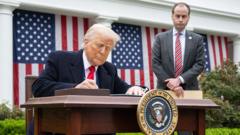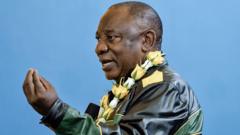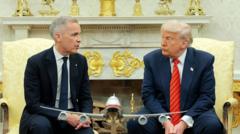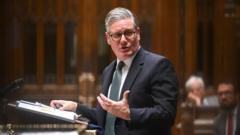In a significant economic move, President Trump has introduced a series of tariffs on imports from various countries, with a primary 10% baseline rate and higher tariffs for what he terms "worst offenders." These efforts, slated to take effect soon, promise to reshape international trade dynamics and provoke responses worldwide.
Trump's New Tariff Strategy: Impacts and Implications

Trump's New Tariff Strategy: Impacts and Implications
President Trump unveils a broad set of tariffs aimed at addressing trade imbalances and protecting American jobs, stirring global economic reactions.
In a bold statement on Wednesday, US President Donald Trump laid out an ambitious new tariff strategy, asserting that the measures would enable the American economy to thrive. The tariffs, enacted through executive order, are anticipated to trigger significant global economic ramifications as they target major trading partners, addressing perceived trade imbalances and safeguarding American jobs.
The cornerstone of Trump's plan is a 10% baseline tariff on all imports, which is scheduled to come into effect on April 5. This levy will primarily be borne by companies that import foreign goods, a decision likely to impact consumer pricing down the line. While numerous countries, including the United Kingdom, Brazil, and Australia, will be subjected to this baseline rate, others deemed "worst offenders" will face steeper tariffs.
Custom tariffs targeting around 60 countries identified as having harmful trade practices will be rolled out starting April 9. These nations include the European Union (20%), China (54%), Vietnam (46%), and Japan (24%). The assertion from White House officials is that these countries either place higher tariffs on US goods, impose non-tariff trade barriers, or engage in behaviors that are perceived to undermine US economic interests.
Notably, Canada and Mexico are exempt from the 10% baseline tariff due to previous tariffs enacted by the Trump administration related to border security and the flow of fentanyl into the US. Those tariffs, initially set at 25%, have been adjusted with specific exemptions.
In addition, Trump confirmed the immediate implementation of a substantial 25% tariff on all foreign-made automobiles, marking a significant escalation in trade measures.
Global leaders have already begun to critique these tariffs, describing them as a "major blow" to international trade relations, with concerns mounting over the potential economic fallout from these unilateral trade decisions. As Trump moves forward with this contentious tariff agenda, the international community watches closely, navigating the complexities of a redefined trade landscape.




















